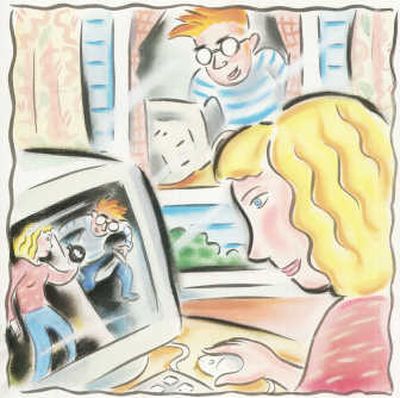Electronic devices disrupt children’s sleep patterns

Each night, Alex Haines, 13, falls asleep to the glow of a television, his cell phone close by his bed. “It’s my gateway to the world. It’s always on,” said Haines, of Hampden Township, Pa. “I’ve been sleeping with this stuff on my whole life since I was 8 or 9, ever since I was old enough to make macaroni and cheese.”
All together, the seventh-grader owns five electronic gadgets, including a camera, laptop and iPod.
Researchers fear an entire generation is suffering from the effects of this “junk sleep,” disrupted sleep blamed on electronic devices, whether it be a computer game played into the wee hours of the night or a cell phone tucked under a pillow.
In a 2006 poll, the National Sleep Foundation found that nearly all teens have at least one electronic gadget such as a television, music device, computer or phone, in their rooms.
On average, sixth-graders have more than two of these items while 12th-graders have about four.
The study showed those with four or more gadgets in their bedrooms were getting insufficient sleep compared to their peers.
“Having these gadgets at home in the room is almost like a doctor on call. Every few minutes you get a page. You’re all groggy,” said Anoop Karippot, a psychiatrist and pediatric sleep specialist at Penn State Milton S. Hershey Medical Center.
“The doctor gets a day off to recuperate. These people are constantly on call.”
Vivi Suthers, 15, a 10th-grader at Camp Hill (Pa.) High School, doesn’t own a cell phone but said she’s been at sleepover parties where all the girls have their phones on all night.
“They don’t want to miss a call,” she said. “Most kids do not know what they would do without their technology.”
Over the past five to six years, cell phones have given teens the opportunity to communicate with their peers but they tend to sacrifice sleep in order to have a social life, Karippot said.
Teens also associate falling asleep to music by playing devices such as iPods but in reality their sleep is fragmented and disrupted by the music, he said.
No studies have been done linking cell phone use to poor sleep but plenty of information is available about the effects of sleeping with television sets flickering.
Even low light from a television screen can disrupt sleep patterns.
No matter, the end result is teens who don’t get sufficient sleep every night will end up having difficulty staying awake and focused in school, Karippot said.
Worse yet, they will make silly mistakes or fall asleep in class which can end up getting them in trouble, he said.
Jake Bingham, 13, of Camp Hill, said he not only falls asleep to music from his iPod but also keeps his cell phone next to his bed.
The eighth-grader at Camp Hill Middle School said he often receives up to eight text messages per night and answers them in the morning.
“I sleep pretty heavy,” he said, adding he gets about seven to eight hours of sleep per night.
Still, experts recommend teens get about nine to 10 hours of sleep every night, otherwise they will suffer from a sleep deficit.
“Your body restores itself when you sleep. What you’ve learned in the day your body stores like backing up in a computer,” Karippot said.
“If you don’t get enough sleep, your body doesn’t back up. You forget things.”